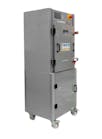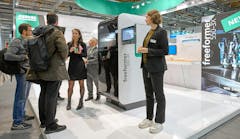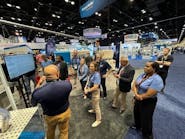Red Series Additive Fusion Technology (AFT) With this 3D printing system and software from 9T Labs, users can make structural composite parts that can compete with aluminum parts at scale within an automated manufacturing environment.
What’s new? The printer, which at the K Show produced a rear suspension rocker arm for a motorcycle made from KetaSpire polyetheretherketone with continuous carbon fiber. Illustrating the printer’s advantages, the part was 37 percent less expensive and 50 percent lighter than a comparable aluminum part. The technology has been available in the U.S. since June, when 9T Labs opened its office in Boston.
Benefits Time and cost savings, compared with manufacturing using traditional means and materials, like metals. According to 9T Labs, users of the printer can reduce design time, make parts that weigh only 20 percent of comparable metal components and save half the cost. The AFT system produces parts in a reproducible and quick fashion — with overnight printing possible.
9T Labs, Boston, Yannick Willemin, yannick@9tlabs.com, www.9tlabs.com
Vital Statistics
| Print volume | 13.8 inches by 10.6 inches by 9.8 inches |
| Printing temperature | 752 degrees Fahrenheit |
| Material storage temperature | 212 degrees Fahrenheit |
| Printable resins | Polyetheretherketone, polyetherketoneketone, polyphenylene sulfide, PA 12, bio-based PA |
| Continuous fibers that can be printed | Carbon, glass, basalt |
| Maximum possible fiber volume content | 60 percent |
Karen Hanna | Senior Staff Reporter
Senior Staff Reporter Karen Hanna covers injection molding, molds and tooling, processors, workforce and other topics, and writes features including In Other Words and Problem Solved for Plastics Machinery & Manufacturing, Plastics Recycling and The Journal of Blow Molding. She has more than 15 years of experience in daily and magazine journalism.






